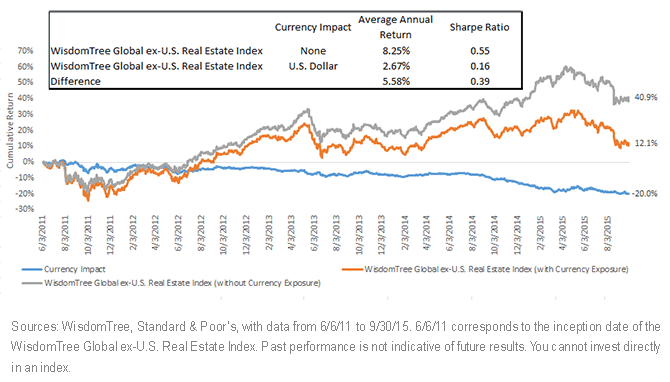Introducing Currency Hedging to Global ex U.S. Real Estate


 For definitions of terms in the chart, please visit our glossary.
• On a cumulative basis, we see that the currencies represented in the WisdomTree Global ex-U.S. Index universe depreciated 20.0% over the period against the U.S. dollar. The difference in average annual returns between the WisdomTree Global ex-U.S. Index measured with currency and without currency impact amounted to nearly 5.6% per year.
• On a risk-adjusted basis, we see that the Sharpe ratio increased by 0.39 when the impact of currency was excluded.
How to Strategically Allocate to Global ex-U.S. Real Estate
In reality, we understand that this period was characterized by dollar strength. However, we pose this question: Is an allocation to global ex-U.S. real estate being made in order to take advantage of a particular movement in currency compared to the U.S. dollar, or is the allocation more due to the attributes of the asset class, such as the income-generating potential? Since we think that exposure to the income-generating assets is of primary importance, we think that approaches designed to mitigate the impact of currency movements could be of interest, and that is why we created the WisdomTree Global ex-U.S. Hedged Real Estate Index.
1Source: Bloomberg.
2Developed international equities refers to the MSCI EAFE Index universe.
3Source: Bloomberg, with data as of 10/28/15.
4Refers to the period of payments occurring over the 12 months prior to September 30 of each year, the annual screening date for this Index.
5Source: Bloomberg, with data as of 10/28/15. Real estate universes: FTSE EPRA/NAREIT Global ex US Index and FTSE EPRA/NAREIT United States Index. Equity universe: MSCI ACWI Index.
6Source: Bloomberg, with data as of 10/28/15.
7Source: Bloomberg, with data as of 10/28/15.
For definitions of terms in the chart, please visit our glossary.
• On a cumulative basis, we see that the currencies represented in the WisdomTree Global ex-U.S. Index universe depreciated 20.0% over the period against the U.S. dollar. The difference in average annual returns between the WisdomTree Global ex-U.S. Index measured with currency and without currency impact amounted to nearly 5.6% per year.
• On a risk-adjusted basis, we see that the Sharpe ratio increased by 0.39 when the impact of currency was excluded.
How to Strategically Allocate to Global ex-U.S. Real Estate
In reality, we understand that this period was characterized by dollar strength. However, we pose this question: Is an allocation to global ex-U.S. real estate being made in order to take advantage of a particular movement in currency compared to the U.S. dollar, or is the allocation more due to the attributes of the asset class, such as the income-generating potential? Since we think that exposure to the income-generating assets is of primary importance, we think that approaches designed to mitigate the impact of currency movements could be of interest, and that is why we created the WisdomTree Global ex-U.S. Hedged Real Estate Index.
1Source: Bloomberg.
2Developed international equities refers to the MSCI EAFE Index universe.
3Source: Bloomberg, with data as of 10/28/15.
4Refers to the period of payments occurring over the 12 months prior to September 30 of each year, the annual screening date for this Index.
5Source: Bloomberg, with data as of 10/28/15. Real estate universes: FTSE EPRA/NAREIT Global ex US Index and FTSE EPRA/NAREIT United States Index. Equity universe: MSCI ACWI Index.
6Source: Bloomberg, with data as of 10/28/15.
7Source: Bloomberg, with data as of 10/28/15.
Important Risks Related to this Article
Foreign investing involves special risks, such as risk of loss from currency fluctuation or political or economic uncertainty.
Investments in emerging, offshore or frontier markets are generally less liquid and less efficient than investments in developed markets and are subject to additional risks, such as risks of adverse governmental regulation and intervention or political developments.
Investments in real estate involve additional special risks, such as credit risk, interest rate fluctuations and the effect of varied economic conditions.

Christopher Gannatti began at WisdomTree as a Research Analyst in December 2010, working directly with Jeremy Schwartz, CFA®, Director of Research. In January of 2014, he was promoted to Associate Director of Research where he was responsible to lead different groups of analysts and strategists within the broader Research team at WisdomTree. In February of 2018, Christopher was promoted to Head of Research, Europe, where he was based out of WisdomTree’s London office and was responsible for the full WisdomTree research effort within the European market, as well as supporting the UCITs platform globally. In November 2021, Christopher was promoted to Global Head of Research, now responsible for numerous communications on investment strategy globally, particularly in the thematic equity space. Christopher came to WisdomTree from Lord Abbett, where he worked for four and a half years as a Regional Consultant. He received his MBA in Quantitative Finance, Accounting, and Economics from NYU’s Stern School of Business in 2010, and he received his bachelor’s degree from Colgate University in Economics in 2006. Christopher is a holder of the Chartered Financial Analyst Designation.

